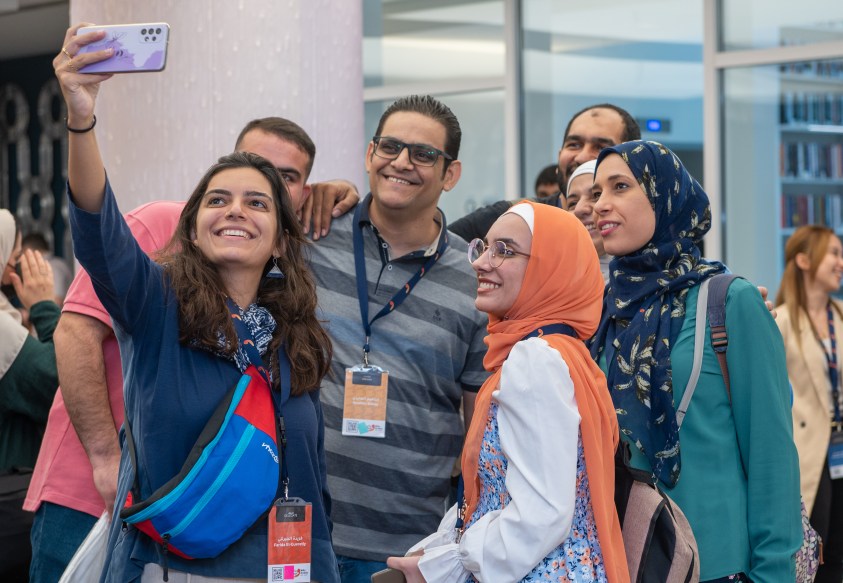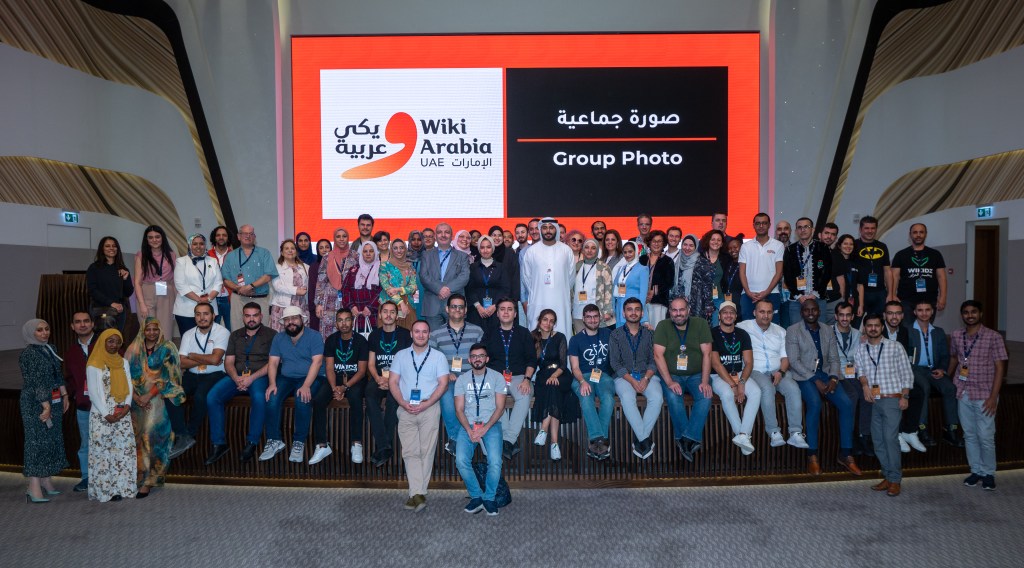The Wikimedia movement in the Middle East and North Africa (MENA) region has been continuously growing over the past decade. The region has 6 percent of the global population and represents 8 percent of internet users worldwide. 85% of monthly web pageviews from the region are on Arabic Wikipedia, making it the largest and most active language Wikipedia in the region.
To start, here are some key details about Wikimedia in this region of the world
- The MENA region includes Algeria, Bahrain, Egypt, Iraq, Jordan, Kuwait, Lebanon, Libya, Morocco, Oman, Palestine, Qatar, Saudi Arabia, Sudan, Syria, Tunisia, United Arab Emirates, and Yemen.
- There are over 400M Arabic speakers (6th most spoken language in the world) Arabic Wikipedia is #17 largest edition by article count and 8th in terms of depth
- Countries with the highest Wikimedia readership: Saudi Arabia, Egypt, Algeria, Iraq
- 3% of global Wikimedia readership comes from the MENA region
As part of the Wikimedia Foundation 2022-2023 Annual Plan, the Foundation is bringing a more regional focus to its work. Staff focused on the region host learning sessions to share the latest updates from the region and work on future projects. Here are some of the takeaways from our MENA learning session:
The region includes several user groups, such as Algeria, Egypt, Iraq, Wikimedians of the Levant, Arabic Wikimedians UG, Morocco, Sudan, UAE, Tunisia and Saudi Arabia, which joined as an official user group in 2022. The user groups in the region face several challenges, including technical challenges such as IP blocks that restrict certain people or regions from editing, government restrictions that make it difficult to receive grants for Wikimedia work from the Wikimedia Foundation, and some difficulty engaging more than a core group of Wikimedians in the region. There are opportunities to find new ways of engaging between the Foundation and the movement in the region to tackle these challenges and welcome more people into the movement. One such recent initiative was the recent regional conference, WikiArabia, hosted in Dubai for the first time.

Celebrating a return to in-person conferences with 2022 WikiArabia
This year the UAE user group hosted the 6th edition of WikiArabia in Dubai. The conference was attended by over100 participants from across the region. The main purpose of the conference was to connect after two years of online gatherings, to learn more about what is happening in the region, and to share projects and build relationships between the user groups.
Outcomes of the conference
In the last year the MENA region celebrated adding two new user groups: the UAE and the Saudi user group. This brought lots of oppurtunities by adding more active Wikimedians who are willing to take part in the regional activities. One of the main outcomes of the conference was how to collaborate together across user groups and work together better. Another outcome was discussions around creating a regional Hub.
The Hub organizers did excellent research regarding the implementation and plan of a proposed Hub. There were two sessions on how to move forward with this idea. Some actions were agreed to be taken by a group of community members who are interested in the Hub.

Supporting User Groups and Affiliates in the region
Over the last several years, communities in the MENA Region have received increased funding from the Foundation. This is a result of the Wikimedia Foundation’s strategy to decentralize resources, especially among underrepresented communities.
During the 2021-2022 fiscal year, the Wikimedia Foundation increased its grants funding to communities globally by 51%. During this time, the broader Middle East and Africa regions received a 279% increase in grants funding, going from USD $784,951 to USD $2,189,257 in fiscal year 2021-22. General Support funds made up the biggest chunk of funding at 59% followed by Rapid Funds at 30% and the Wikimedia Alliances fund at 10%. 100% of total investments in this region were to emerging communities.
Some of the communities in the MENA Region funded include those from United Arab Emirates, Lebanon, Oman, Jordan, Palestine, Iraq [WikiforHumanRights Campaign], Algeria [Wiki Loves Africa Project] , Tunisia, Sudan and Morocco [ Reading Wikipedia in the Classroom Project. The projects being supported by these grants focus on issues such as education, preservation and documentation of cultural heritage, such as the Wikimedians of the Levant – Open Jordanian Heritage Project Other programs focus on increasing awareness of the Wikimedia projects and helping develop contributor skills.
Partnerships
In the MENA region, we are focusing on raising awareness of Wikimedia, reaching new audiences, recruiting and training new editors, and introducing them to the movement.
MENA University Student Translation Program with Ideas Beyond Borders
In early 2021, the Wikimedia Foundation partnered with the nonprofit organization Ideas Beyond Borders (IBB) to conduct a 2 year MENA university education program in Iraq focusing on creating Arabic Wikipedia content, and testing editor recruitment and retention strategies. With the support of the Foundation’s Education Team, the Wikimedia Foundation Partnerships and IBB teams co-developed curriculum focused on improving critical thinking and media literacy skills, resulting in more student engagement and increased number of new contributors being introduced to the Iraqi Wikimedia User Group and wider Arabic Wikimedia community. We’ve improved our retention strategy by building a relationship with the Iraqi Ministry of Higher Education, established Wikipedia University Clubs and engaged new contributors directly with the MENA affiliates.
- Program is taking place at 4 Iraqi universities
- Over 270 students graduated
- 78% of students enrolled completed the course
- Over 60% of participants are women
- Almost 2000 new or improved articles on Arabic Wikipedia.
- Exploring replication in 2023 at universities across MENA
Conclusion
Members of our movement play a major role in the various initiatives on the Wikimedia projects in the region. These initiatives are a key way to invite more newcomers to the Wikimedia projects and broader movement. Participating in events such as WikiArabia in-person, or through communication development projects online, the MENA region continues to collaborate and create impactful work in spite of some challenges they still face.
We are looking forward to engaging more with the region and expect to learn even more through the ongoing learning sessions which will help to highlight urgent priorities.

Can you help us translate this article?
In order for this article to reach as many people as possible we would like your help. Can you translate this article to get the message out?
Start translation